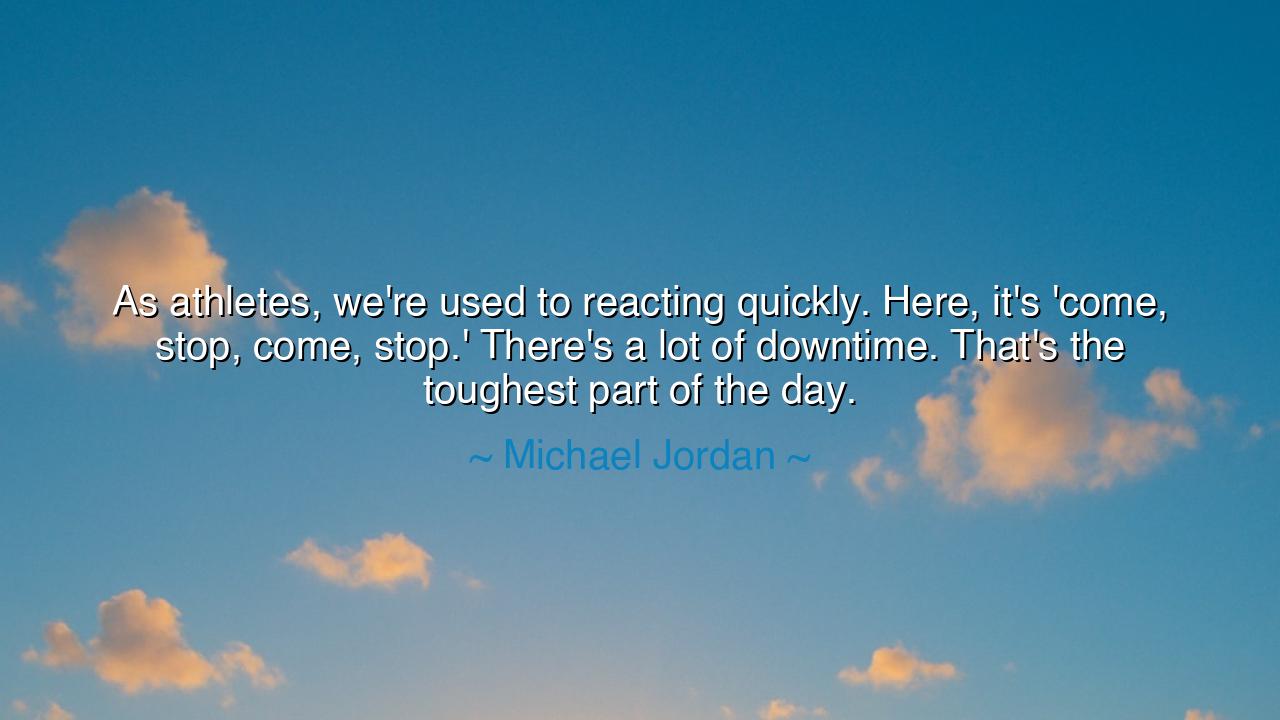
As athletes, we're used to reacting quickly. Here, it's 'come
As athletes, we're used to reacting quickly. Here, it's 'come, stop, come, stop.' There's a lot of downtime. That's the toughest part of the day.






Listen closely, O seeker of wisdom, to the words of Michael Jordan, a paragon of athletic mastery, who confessed: “As athletes, we're used to reacting quickly. Here, it's 'come, stop, come, stop.' There's a lot of downtime. That's the toughest part of the day.” In these words lies a subtle, profound truth: the greatest trials are not always those of outward exertion, but the quiet battles of the mind, the struggle to endure periods of downtime, stillness, and patience when the spirit longs for action.
From the earliest contests of men, warriors have known this truth. The Roman legionary, trained to strike with speed and precision, found the days between battles to be most taxing—not for lack of skill, but for the restlessness of expectation. Jordan’s insight mirrors this ancient understanding: even the swiftest, most decisive, and most disciplined may falter when called to remain motionless, when the world demands patience rather than immediate reaction.
The essence of athletic discipline is not merely in rapid responses or heroic feats, but in the mastery of one’s own inner rhythm. In times of downtime, the mind may wander, doubt may creep, and the body may ache for action. Consider the legendary figure of Sir Edmund Hillary during his ascent of Everest. Though trained and prepared for sudden exertion, he confronted hours of waiting in icy stillness, each moment a trial of endurance. It was in this stillness, not only in climbing, that true fortitude was forged.
Jordan speaks to the modern athlete’s paradox: we are taught to thrive in motion, to excel in reaction, yet the hardest test lies in the stillness between bursts of effort. The court may fall silent, the ball may rest, and the mind must remain vigilant, poised, and ready, even when the body yearns to move. This tension—the discipline of readiness amid downtime—becomes the measure of mastery, the quiet crucible where champions are tempered.
History and legend are replete with such trials. The Spartan warriors, whose lives were dedicated to swift and decisive combat, faced long marches and watches, standing for hours in frozen dawns, enduring the downtime between moments of battle. In these hours, the soul is tested more than the body, for the mind can yield to impatience, and courage can wane. Jordan’s reflection carries this truth forward into the modern age: the toughest part of the day is often the unseen, uncelebrated period of waiting.
Yet within this challenge lies the opportunity for growth. The ability to remain composed during downtime fosters resilience, fortitude, and mental acuity. Consider the tale of the great chess master Emanuel Lasker, who, while sitting in silence during hours of contemplation, prepared himself to strike decisively at the opportune moment. It was not the motion but the stillness that honed his genius. In sport, as in life, readiness amid stillness defines those who endure and triumph.
Therefore, the lesson emerges with clarity: do not despise periods of pause or inactivity, for they are as vital as moments of action. Set practical actions for yourself: cultivate patience, maintain alertness even when the pace slows, use moments of waiting to reflect and strengthen your mind, and embrace the downtime as a quiet training ground for resilience. By mastering the still moments, you prepare yourself to respond with greater clarity, speed, and power when the call to action arrives.
Walk forward, O listener, as Jordan walks the court, poised and ready. Learn to endure the toughest part of the day, the stillness between bursts, and transform it into a forge of strength. Let your mind remain swift even in stillness, your spirit vigilant amid waiting, and your heart courageous in the quiet. In this balance of action and repose lies the secret of greatness, the eternal rhythm of mastery, and the wisdom passed from the ancients to all who seek excellence.






AAdministratorAdministrator
Welcome, honored guests. Please leave a comment, we will respond soon